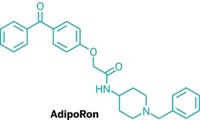Advertisement
Grab your lab coat. Let's get started
Welcome!
Welcome!
Create an account below to get 6 C&EN articles per month, receive newsletters and more - all free.
It seems this is your first time logging in online. Please enter the following information to continue.
As an ACS member you automatically get access to this site. All we need is few more details to create your reading experience.
Not you? Sign in with a different account.
Not you? Sign in with a different account.
ERROR 1
ERROR 1
ERROR 2
ERROR 2
ERROR 2
ERROR 2
ERROR 2
Password and Confirm password must match.
If you have an ACS member number, please enter it here so we can link this account to your membership. (optional)
ERROR 2
ACS values your privacy. By submitting your information, you are gaining access to C&EN and subscribing to our weekly newsletter. We use the information you provide to make your reading experience better, and we will never sell your data to third party members.
Drug Discovery
Antimalarial drugs could also treat polycystic ovary syndrome
Artemisinin derivatives disrupt androgen synthesis in the ovaries of both rodents and people
by Brianna Barbu
June 13, 2024
| A version of this story appeared in
Volume 102, Issue 18
Polycystic ovary syndrome (PCOS) is an endocrine disorder that affects millions of people worldwide, including about 8–13% of reproductive-aged women, according to the World Health Organization. People with PCOS have higher than normal levels of progesterone, testosterone, and other androgens, which can lead to irregular menstrual periods, ovarian cysts, infertility, and a higher risk for metabolic disorders. Current treatments address only the symptoms of PCOS, not the underlying hormone imbalance.
Now a team led by Qi-Qun Tang of the Fudan University School of Basic Medical Sciences has reported in Science that derivatives of the malaria treatment artemisinin, may also be effective against PCOS (2024, DOI: 10.1126/science.adk5382).
The researchers found that injections of the artemisinin derivative artemether lowered ovarian testosterone levels in rodent models of PCOS, improved the appearance of the animals’ ovarian tissues, and regulated their estrous cycles. They determined through cell studies that the drug works by promoting the degradation of a key androgen-producing enzyme.
The researchers also did a pilot clinical study of 19 women with PCOS. Taking dihydroartemisinin pills for 12 weeks reduced most of the participants’ androgen levels, and more than half of the participants had more-regular menstrual cycles after receiving the treatment. Tang says he and his team are now optimizing doses and timing for a larger clinical trial.
Elisabet Stener-Victorin, who researches PCOS at the Karolinska Institute, writes in a perspective article that she would like to see more investigation of the metabolic and long-term effects of artemisinin-based PCOS treatment, but adds that this study “represents a promising new approach . . . to improve the quality of life of millions.”




Join the conversation
Contact the reporter
Submit a Letter to the Editor for publication
Engage with us on Twitter